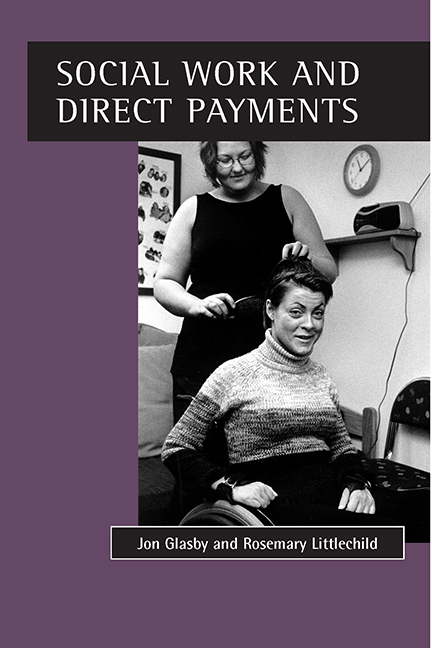Book contents
- Frontmatter
- Contents
- List of tables and boxes
- Foreword
- Acknowledgements
- List of abbreviations
- one Introduction
- two History
- three From indirect to direct payments I: legislation
- four From indirect to direct payments II: guidance and extension
- five The progress of direct payments
- six The experiences of different user groups
- seven The advantages of direct payments
- eight Possible difficulties
- nine Practical issues
- ten Conclusion: implications for community care
- Bibliography
- Appendix Useful resources
- Index
- Related reports from The Policy Press
six - The experiences of different user groups
Published online by Cambridge University Press: 05 April 2022
- Frontmatter
- Contents
- List of tables and boxes
- Foreword
- Acknowledgements
- List of abbreviations
- one Introduction
- two History
- three From indirect to direct payments I: legislation
- four From indirect to direct payments II: guidance and extension
- five The progress of direct payments
- six The experiences of different user groups
- seven The advantages of direct payments
- eight Possible difficulties
- nine Practical issues
- ten Conclusion: implications for community care
- Bibliography
- Appendix Useful resources
- Index
- Related reports from The Policy Press
Summary
The strongest calls for direct payments to be introduced came fromorganisations of disabled people, many of whom had previously benefited fromthe choice and control offered by indirect payments and the ILF (Kestenbaum,1993a, 1993b, 1999; Morris, 1993a). As a result, direct payments have tendedto be associated primarily with people with physical impairments, and manyof the advantages cited in Chapter Seven of this book are often advantagesdescribed from the perspective of people with physical impairments or theirrepresentatives. In contrast, research to date suggests that relatively fewpeople with learning difficulties have been offered the opportunity toreceive direct payments, with even fewer recipients among people with mentalhealth problems, older people and people with HIV/AIDS. Direct payments havealso been shown to raise particular issues for people from minority ethnicgroups and for gay men/lesbians. Against this background, this chapterexplores the different experiences of various user groups, consideringissues such as access to direct payments, the attitudes of practitioners andpossible ways forward.
People with physical impairments
Throughout the UK, the vast majority of people receiving direct payments havebeen those classed as having physical impairments. In 1998, Department ofHealth research suggested that 1,329 of 1,404 direct payment recipients inEngland (95%) were people with physical or sensory impairments (Auld, 1999).By 2000, the ADSS found that 110 out of 136 English and Welsh authoritieshad direct payment schemes available to service users with all types ofimpairment, but noted that a significant minority excluded particular groupsof people (Jones, 2000). In Scotland, 87% of recipients of direct paymentshave physical or sensory impairments (Witcher et al, 2000).
In many ways, this should not be surprising, since people with physicalimpairments have traditionally formed user groups that have been morepowerful and politically active than those of other service users (M.Barnes, 1997). At the same time, the imperative to ensure that recipients ofdirect payments are willing and able to manage them (alone or withassistance) is likely to have been interpreted by some local authorities asruling out most user groups other than people with physical impairments. Insome locations, staff specialising in work with people with physicalimpairments may also be much more familiar with the concepts of independentliving and direct payments than their colleagues in mental health, learningdifficulty or other teams.
- Type
- Chapter
- Information
- Social Work and Direct Payments , pp. 63 - 84Publisher: Bristol University PressPrint publication year: 2002



